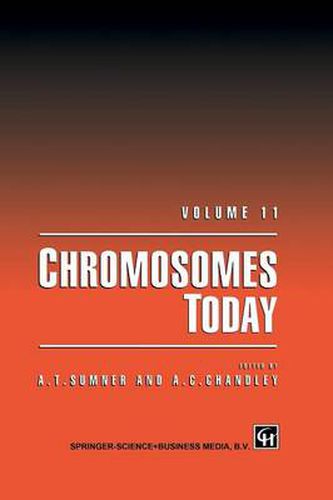Readings Newsletter
Become a Readings Member to make your shopping experience even easier.
Sign in or sign up for free!
You’re not far away from qualifying for FREE standard shipping within Australia
You’ve qualified for FREE standard shipping within Australia
The cart is loading…






This title is printed to order. This book may have been self-published. If so, we cannot guarantee the quality of the content. In the main most books will have gone through the editing process however some may not. We therefore suggest that you be aware of this before ordering this book. If in doubt check either the author or publisher’s details as we are unable to accept any returns unless they are faulty. Please contact us if you have any questions.
When the late Professor C. D. Darlington founded what developed into the International Chromosome Conferences in Oxford in 1964, he was concerned that scientists who worked on different aspects of chromosomes, or who studied them in different ways, should have the opportunity of discussing the fundamental problems of chromosomes with one another . The fact that well over 300 scientists with a wide variety of interests came to Edinburgh in August 1992 for the 11th International Chromosome Conference shows that there is still the same need, and also the desire among chromosomologists to have such discussions. The present volume contains almost all the invited contributions, and attests to the diversity of approaches and applications in chromosomal studies. A few years ago it may have seemed to some that chromosome studies were being superseded by molecular biology, but the molecular biologists have now realized that they need to know about chromosomes, and indeed an important, if ill-defined discipline of ‘molecular cytogenetics’ has grown up in recent years. We are pleased that in planning the Conference and this book, so much of the work presented is at the interface between cytogenetics and molecular biology. This will surely continue in the future, as boundaries between disciplines are largely artificial, and each has much to learn from the others.
$9.00 standard shipping within Australia
FREE standard shipping within Australia for orders over $100.00
Express & International shipping calculated at checkout
This title is printed to order. This book may have been self-published. If so, we cannot guarantee the quality of the content. In the main most books will have gone through the editing process however some may not. We therefore suggest that you be aware of this before ordering this book. If in doubt check either the author or publisher’s details as we are unable to accept any returns unless they are faulty. Please contact us if you have any questions.
When the late Professor C. D. Darlington founded what developed into the International Chromosome Conferences in Oxford in 1964, he was concerned that scientists who worked on different aspects of chromosomes, or who studied them in different ways, should have the opportunity of discussing the fundamental problems of chromosomes with one another . The fact that well over 300 scientists with a wide variety of interests came to Edinburgh in August 1992 for the 11th International Chromosome Conference shows that there is still the same need, and also the desire among chromosomologists to have such discussions. The present volume contains almost all the invited contributions, and attests to the diversity of approaches and applications in chromosomal studies. A few years ago it may have seemed to some that chromosome studies were being superseded by molecular biology, but the molecular biologists have now realized that they need to know about chromosomes, and indeed an important, if ill-defined discipline of ‘molecular cytogenetics’ has grown up in recent years. We are pleased that in planning the Conference and this book, so much of the work presented is at the interface between cytogenetics and molecular biology. This will surely continue in the future, as boundaries between disciplines are largely artificial, and each has much to learn from the others.